Submissions: 2021 June
- Chris Peterson
- Abominable Snowman
- Posts: 18629
- Joined: Wed Jan 31, 2007 11:13 pm
- Location: Guffey, Colorado, USA
- Contact:
Re: Submissions: 2021 June
M101, The Whirlpool Galaxy
Telescope: GSO RC-10 on a Paramount MYT
Camera: QSI 660ws-8 (0.93 arcsec/pixel)
Lum: 150 min (30 x 5 min)
Red: 95 min (19 x 5 min)
Green: 110 min (22 x 5 min)
Blue: 95 min (19 x 5 min)
Processing: PixInsight, Photoshop
_
Telescope: GSO RC-10 on a Paramount MYT
Camera: QSI 660ws-8 (0.93 arcsec/pixel)
Lum: 150 min (30 x 5 min)
Red: 95 min (19 x 5 min)
Green: 110 min (22 x 5 min)
Blue: 95 min (19 x 5 min)
Processing: PixInsight, Photoshop
_
Chris
*****************************************
Chris L Peterson
Cloudbait Observatory
https://www.cloudbait.com
*****************************************
Chris L Peterson
Cloudbait Observatory
https://www.cloudbait.com
-
rwittich_de
- Ensign
- Posts: 78
- Joined: Thu Feb 03, 2011 12:53 pm
- Contact:
Re: Submissions: 2021 June
A partial solar eclipse is nice to see. A Solar transit of the ISS is too. But both a the same time is a real rare event.
-
Nicolas Adriano
- Ensign
- Posts: 20
- Joined: Wed Oct 07, 2020 5:06 pm
Re: Submissions: 2021 June
The Crux and the Coalsack
Copyright: Nicolas Adriano
Image URL: https://cdn.astrobin.com/images/67318/2 ... 10c2d0.jpg
Dates: 01 and 02 June 2021
Location: MG, Brazil. Suburban Skies (Bortle 5, calculated SQM ~19.87)
Camera: Nikon D5300 (modded) @ ISO400
Optics: Rokinon 135mm F/2.0 ED UMC
Mount: Sky-Watcher Star Adventurer
Exposure Detail: 3-Panel Mosaic | each 124 and 138x60s | Total integration 262min or 4hrs22min
Copyright: Nicolas Adriano
Image URL: https://cdn.astrobin.com/images/67318/2 ... 10c2d0.jpg
Dates: 01 and 02 June 2021
Location: MG, Brazil. Suburban Skies (Bortle 5, calculated SQM ~19.87)
Camera: Nikon D5300 (modded) @ ISO400
Optics: Rokinon 135mm F/2.0 ED UMC
Mount: Sky-Watcher Star Adventurer
Exposure Detail: 3-Panel Mosaic | each 124 and 138x60s | Total integration 262min or 4hrs22min
Re: Submissions: 2021 June
Touching infinity
Copyright: Marcelo Maturana Rodríguez (@matuutex)
Location: Osorno Volcano - Chile
Copyright: Marcelo Maturana Rodríguez (@matuutex)
Location: Osorno Volcano - Chile
-
ChrisKotsiopoulos
- Ensign
- Posts: 70
- Joined: Mon Mar 15, 2010 2:23 pm
Partial Solar eclipse from Reading UK
After a battle with the clouds I manage to capture the partial eclipse. The processing technique in the black Sun image is called Solarization.
Camera Model Nikon D600, Shooting Date/Time 10/06/2019 11:15, Author Chris Kotsiopoulos, Sigma 400mm APO Macro lens
Camera Model Nikon D600, Shooting Date/Time 10/06/2019 11:15, Author Chris Kotsiopoulos, Sigma 400mm APO Macro lens
Re: Submissions: 2021 June
The Runaway Star of SH2-27
https://www.astrobin.com/39tu57/B/
Copyright: Mathew Ludgate SH2-27 is an extremely large ionisation nebula in Ophiucus, which spans 13 degrees or 26 full moons across the sky. SH2-27 is ionised by Zeta Ophiuchi (Zeta Oph), which is a massive super-hot O-type star. Zeta Oph is a run away star, and is somewhat famous after some great images of its bow shockwave were published by NASA from the WISE and Spitzer infrared space telescopes.
This a composite image combining my data with the infrared bow shock image from the WISE IR telescope, courtesy of NASA/JPL-Caltech/UCLA. This adds some nice extra detail to the bow shock region.
https://www.astrobin.com/39tu57/ is an image with only my data.
In this image Zeta Oph is moving from the top left towards the bottom right. You can see a large flat OIII bow shock which spans ~1.35 degrees, and has small ‘contrails’ streaking out behind the shockwave along the direction of travel. In front of the main shockwave there is a further area of fainter OIII emission, which appears to be a secondary bow shock.
The Ha bow shock is a little less intense than the OIII emission, but trailing behind the bow shock are well defined linear Ha emission contrails. These Ha contrails are much longer than the OIII contrails, trailing for ~1.6 degrees behind the bow shock, and are also orientated along the same direction of travel. I can not find any prior reports describing these Ha contrails or the OIII secondary bow shock. An animated GIF showing the OIII, Ha and IR bow shock features.
This is a 3 panel mosaic which was captured from Dunedin, New Zealand in May and June 2021 using a Nikon 200mm f/2 lens and an ASI6200MM Pro camera with Chroma filters. The total exposure was 30.4 hours.
Cheers,
Mathew
https://www.astrobin.com/39tu57/B/
Copyright: Mathew Ludgate SH2-27 is an extremely large ionisation nebula in Ophiucus, which spans 13 degrees or 26 full moons across the sky. SH2-27 is ionised by Zeta Ophiuchi (Zeta Oph), which is a massive super-hot O-type star. Zeta Oph is a run away star, and is somewhat famous after some great images of its bow shockwave were published by NASA from the WISE and Spitzer infrared space telescopes.
This a composite image combining my data with the infrared bow shock image from the WISE IR telescope, courtesy of NASA/JPL-Caltech/UCLA. This adds some nice extra detail to the bow shock region.
https://www.astrobin.com/39tu57/ is an image with only my data.
In this image Zeta Oph is moving from the top left towards the bottom right. You can see a large flat OIII bow shock which spans ~1.35 degrees, and has small ‘contrails’ streaking out behind the shockwave along the direction of travel. In front of the main shockwave there is a further area of fainter OIII emission, which appears to be a secondary bow shock.
The Ha bow shock is a little less intense than the OIII emission, but trailing behind the bow shock are well defined linear Ha emission contrails. These Ha contrails are much longer than the OIII contrails, trailing for ~1.6 degrees behind the bow shock, and are also orientated along the same direction of travel. I can not find any prior reports describing these Ha contrails or the OIII secondary bow shock. An animated GIF showing the OIII, Ha and IR bow shock features.
This is a 3 panel mosaic which was captured from Dunedin, New Zealand in May and June 2021 using a Nikon 200mm f/2 lens and an ASI6200MM Pro camera with Chroma filters. The total exposure was 30.4 hours.
Cheers,
Mathew
Re: Submissions: 2021 June
Partial solar eclipse and ISS transit
Special events require a long, detailed pre-planning - and then usually have the consequence that you are somewhere in the pouring rain under a closed cloud cover. Or you give the whole thing a less important meaning and think "this time - without stress - very comfortably in the garden, what is 7% coverage ..."
Yes, it was actually planned that way. My car should have been in the workshop at 9 a.m. and then I just went into the garden with the Dobsonian. Too bad I was up before my alarm clock went off and for some reason checked the upcoming ISS transits online ... but wait a minute, today? during the solar eclipse? and the central line is only a good 30km away? and the ISS as close as possible, in other words really big?
From then on it had to be quick. Postpone the workshop appointment, scout out the observation site online, load the car, drive there. So far so good, the actual partial darkness was only a minor matter from then on. So I arrived at the planned place after the first contact, set up and tried to take the first photos. And then what? Sure, clouds !! Increasingly dense, the chances of seeing something dwindled. But what do you do?
From the idyllic hill I had a beautiful view over the valley and saw more blue sky and sunshine in a westerly direction. A new location was searched for, found and somehow it was also reachable. I didn't care where it was by now. If necessary also right next to the street. It should take me about half an hour for the almost 20km as the crow flies - arrival then, according to the navigation system, less than 10 minutes before the event. Most of the equipment was thrown into the car assembled and then let's go.
Pure thrills, slow trucks, lots of speed cameras and police checks and finally a construction site traffic light - always with an eye on the arrival time.
When the shadow of the ISS finally flickered through the display and the file was actually on the memory card, I was finally able to take a deep breath. But hey, everyone can do it easy? So much for the topic of "just no stress"
And at the end of the day, the car came to the workshop.
 Partial solar eclipse and ISS transit by Johannes Hildebrandt, auf Flickr
Partial solar eclipse and ISS transit by Johannes Hildebrandt, auf Flickr
Special events require a long, detailed pre-planning - and then usually have the consequence that you are somewhere in the pouring rain under a closed cloud cover. Or you give the whole thing a less important meaning and think "this time - without stress - very comfortably in the garden, what is 7% coverage ..."
Yes, it was actually planned that way. My car should have been in the workshop at 9 a.m. and then I just went into the garden with the Dobsonian. Too bad I was up before my alarm clock went off and for some reason checked the upcoming ISS transits online ... but wait a minute, today? during the solar eclipse? and the central line is only a good 30km away? and the ISS as close as possible, in other words really big?
From then on it had to be quick. Postpone the workshop appointment, scout out the observation site online, load the car, drive there. So far so good, the actual partial darkness was only a minor matter from then on. So I arrived at the planned place after the first contact, set up and tried to take the first photos. And then what? Sure, clouds !! Increasingly dense, the chances of seeing something dwindled. But what do you do?
From the idyllic hill I had a beautiful view over the valley and saw more blue sky and sunshine in a westerly direction. A new location was searched for, found and somehow it was also reachable. I didn't care where it was by now. If necessary also right next to the street. It should take me about half an hour for the almost 20km as the crow flies - arrival then, according to the navigation system, less than 10 minutes before the event. Most of the equipment was thrown into the car assembled and then let's go.
Pure thrills, slow trucks, lots of speed cameras and police checks and finally a construction site traffic light - always with an eye on the arrival time.
When the shadow of the ISS finally flickered through the display and the file was actually on the memory card, I was finally able to take a deep breath. But hey, everyone can do it easy? So much for the topic of "just no stress"
And at the end of the day, the car came to the workshop.
 Partial solar eclipse and ISS transit by Johannes Hildebrandt, auf Flickr
Partial solar eclipse and ISS transit by Johannes Hildebrandt, auf Flickr-
a.carrozzi
- Ensign
- Posts: 62
- Joined: Tue Aug 25, 2015 9:58 am
Re: Submissions: 2021 June
10th June solar eclipse taken from northern Italy among the clouds
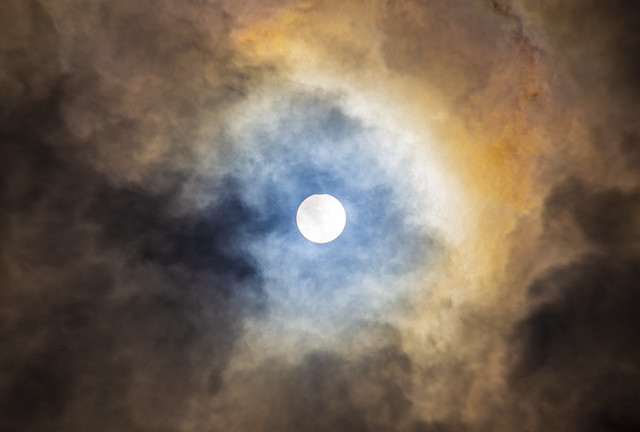 Partial Solar Eclipse - June 10th 2021 by Alessandro Carrozzi, su Flickr
Partial Solar Eclipse - June 10th 2021 by Alessandro Carrozzi, su Flickr
 Partial Solar Eclipse - June 10th 2021 by Alessandro Carrozzi, su Flickr
Partial Solar Eclipse - June 10th 2021 by Alessandro Carrozzi, su Flickr-
Amalbiju_astro
- Asternaut
- Posts: 1
- Joined: Thu Apr 01, 2021 6:21 am
Re: Submissions: 2021 June
Last edited by bystander on Sat Jun 12, 2021 4:18 am, edited 1 time in total.
Reason: All <img> tags require an image url not a page url
Reason: All <img> tags require an image url not a page url
Re: Submissions: 2021 June
IC1396 Sh-131 VdB142
Telescope: Astro-Physics 130GTX
KAF16803 ccd
45 hours in SHO (SII, H-alpha, OIII all at 3nm)
Pixinsight with traditional Hubble Palette
Taken from Villaverde Observatory (IT), 230m above seal level
Copyright:Marco Cosmacini
4Kx4K image can be seen here:
https://www.flickr.com/gp/cosmacini/f0af2J
Thumbnail 1K below:
Telescope: Astro-Physics 130GTX
KAF16803 ccd
45 hours in SHO (SII, H-alpha, OIII all at 3nm)
Pixinsight with traditional Hubble Palette
Taken from Villaverde Observatory (IT), 230m above seal level
Copyright:Marco Cosmacini
4Kx4K image can be seen here:
https://www.flickr.com/gp/cosmacini/f0af2J
Thumbnail 1K below:
Marco Cosmacini
Villaverde Observatory
Italy
Villaverde Observatory
Italy
Re: Submissions: 2021 June
Aircraft transits the Moon with Venus in conjunction
 Aircraft transits the Moon with Venus in conjunction by Tom Glenn, on Flickr
Aircraft transits the Moon with Venus in conjunction by Tom Glenn, on Flickr
An aircraft transits the young crescent Moon in this image, captured on June 11, 2021, at 21:04 PDT, from San Diego, CA. Venus and the Moon were in conjunction at the time, and the image was captured approximately one hour after sunset, with the 2.8% illuminated Moon resting just 3 degrees above the local horizon. The aircraft is visible only by its streak of colored lights, resulting from the 2s exposure, as it transits the "Earthshine" side of the Moon. There are several other aircraft visible in frame. The prominent star near the Moon is Mebsuta (Epsilon Geminorum, magnitude +3). The time of the image coincides with the end of nautical twilight, and the beginning of astronomical twilight, and there is still a visible color gradient from deep red to blue in the sky. The image was captured with a Nikon D5600 using a 70-200mm zoom lens at 200mm, f/2.8, ISO 100, 2s.
 Aircraft transits the Moon with Venus in conjunction by Tom Glenn, on Flickr
Aircraft transits the Moon with Venus in conjunction by Tom Glenn, on FlickrAn aircraft transits the young crescent Moon in this image, captured on June 11, 2021, at 21:04 PDT, from San Diego, CA. Venus and the Moon were in conjunction at the time, and the image was captured approximately one hour after sunset, with the 2.8% illuminated Moon resting just 3 degrees above the local horizon. The aircraft is visible only by its streak of colored lights, resulting from the 2s exposure, as it transits the "Earthshine" side of the Moon. There are several other aircraft visible in frame. The prominent star near the Moon is Mebsuta (Epsilon Geminorum, magnitude +3). The time of the image coincides with the end of nautical twilight, and the beginning of astronomical twilight, and there is still a visible color gradient from deep red to blue in the sky. The image was captured with a Nikon D5600 using a 70-200mm zoom lens at 200mm, f/2.8, ISO 100, 2s.
-
KuriousGeorge
- Science Officer
- Posts: 218
- Joined: Wed Dec 30, 2015 7:07 am
- Location: San Diego, CA
- Contact:
Re: Submissions: 2021 June
June is always a great month for imaging with the ocean marine layer covering the lower altitude city light. Skies at 4,200' in Julian, CA are then 21.5+ SQM nearly every day.
This is the first of three objects I acquired over 12 days. Only 4 days were overcast when the wind blew the marine layer east into and over the mountains.
"The Wild Duck Cluster (also known as Messier 11, or NGC 6705) is an open cluster of stars in the constellation Scutum (the Shield). It was discovered by Gottfried Kirch in 1681. Charles Messier included it in his catalogue of diffuse objects in 1764. Its popular name derives from the brighter stars forming a triangle which could resemble a flying flock of ducks (or, from other angles, one swimming duck). The cluster is located just to the east of the Scutum Star Cloud midpoint.
The Wild Duck Cluster is one of the richest and most compact of the known open clusters. It is one of the most massive open clusters known, and it has been extensively studied. Its age has been estimated to about 316 million years."
https://www.astrobin.com/nbjsqb/
This is the first of three objects I acquired over 12 days. Only 4 days were overcast when the wind blew the marine layer east into and over the mountains.
"The Wild Duck Cluster (also known as Messier 11, or NGC 6705) is an open cluster of stars in the constellation Scutum (the Shield). It was discovered by Gottfried Kirch in 1681. Charles Messier included it in his catalogue of diffuse objects in 1764. Its popular name derives from the brighter stars forming a triangle which could resemble a flying flock of ducks (or, from other angles, one swimming duck). The cluster is located just to the east of the Scutum Star Cloud midpoint.
The Wild Duck Cluster is one of the richest and most compact of the known open clusters. It is one of the most massive open clusters known, and it has been extensively studied. Its age has been estimated to about 316 million years."
https://www.astrobin.com/nbjsqb/
-
Juan Lozano
- Ensign
- Posts: 45
- Joined: Wed Feb 06, 2013 8:24 am
- Location: Elche (Alicante) Spain
- Contact:
Re: Submissions: 2021 June
Sagittarius triplet
http://observatorioelche.blogspot.com/2 ... ecial.html
Copyright: Juan Lozano de Haro
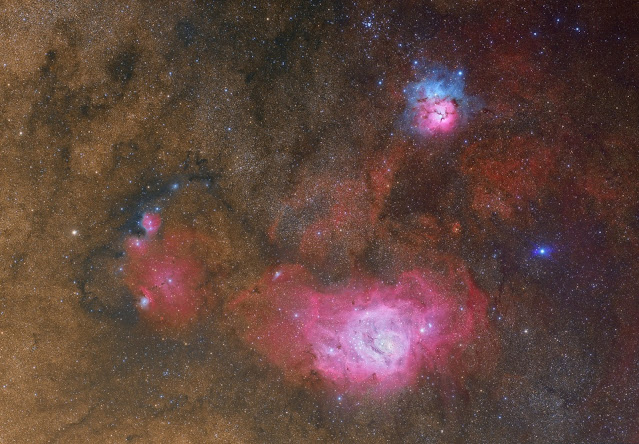
http://observatorioelche.blogspot.com/2 ... ecial.html
Copyright: Juan Lozano de Haro

Last edited by bystander on Mon Jun 14, 2021 1:28 pm, edited 1 time in total.
Reason: Please, no hot links to images > 500 kb
Reason: Please, no hot links to images > 500 kb
-
Wissam Ayoub
- Ensign
- Posts: 33
- Joined: Tue Oct 13, 2020 5:40 pm
Re: Submissions: 2021 June
M20 - The Trifid Nebula
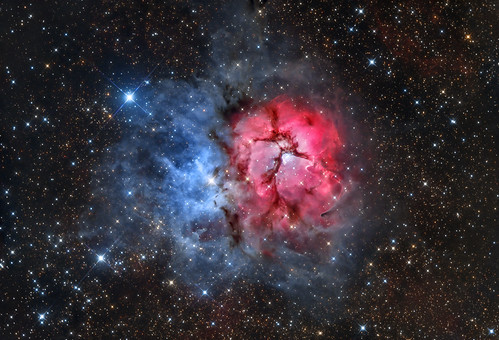
https://flic.kr/p/2m4JQqu
https://astrob.in/3z7n0r/0/
Copyright: Wissam Ayoub,

https://flic.kr/p/2m4JQqu
https://astrob.in/3z7n0r/0/
Copyright: Wissam Ayoub,
-
andrystix
Re: Submissions: 2021 June
 Oltretutto by Andrystix
Oltretutto by AndrystixRise of milky way over the Marche region, in Italy.
Location: Serra San Quirico
Date: 9-6-21 11 pm
two panel merged with PS:
top -> 57 shoots tracked with iOptron Sky Guider Pro (stacked with Sequator)
bottom - > single shoot for the ground
each shoot has the same setting: 30s, ISO800, f/5
exif: Nikon D750 (modded), AF-S NIKKOR 20mm f/1.8G ED, iOptron Skyguider Pro.
social: @andrystix
-
barretosmed
- Science Officer
- Posts: 486
- Joined: Thu Oct 12, 2017 6:04 pm
Re: Submissions: 2021 June
Wishing Well Cluster (NGC 3532) and Its Hubble Affair
Designed between the 1970s and 1980s, the Hubble Space Telescope went into space on April 24, 1990, its first image being taken on May 20 of that same year, more than 31 years ago, the first image being the Wishing Well Cluster (NGC 3532).
https://www.nasa.gov/content/hubbles-first-light
This cluster has this name because it resembles silver coins thrown at the bottom of a well, in addition to other names such as: American football ball or a cluster of fireflies.
Discovered in South Africa by Frenchman Nicolas Louis de Lacaille in 1752, it is an object easily seen with the naked eye in the southern hemisphere.
Best details:
https://www.astrobin.com/full/b1jqmo/0/?nc=user
EQUIPMENT:
ZWO ASI 6200MC PRO COLED
Spirit 150mm
35 X 300 sec
Date: . 06/06/2020
Location: Campos do Jordão- SP - Brazil
Copyright: Fernando Oliveira de Menezes
Email: Barretosmed@hotmail.com
Designed between the 1970s and 1980s, the Hubble Space Telescope went into space on April 24, 1990, its first image being taken on May 20 of that same year, more than 31 years ago, the first image being the Wishing Well Cluster (NGC 3532).
https://www.nasa.gov/content/hubbles-first-light
This cluster has this name because it resembles silver coins thrown at the bottom of a well, in addition to other names such as: American football ball or a cluster of fireflies.
Discovered in South Africa by Frenchman Nicolas Louis de Lacaille in 1752, it is an object easily seen with the naked eye in the southern hemisphere.
Best details:
https://www.astrobin.com/full/b1jqmo/0/?nc=user
EQUIPMENT:
ZWO ASI 6200MC PRO COLED
Spirit 150mm
35 X 300 sec
Date: . 06/06/2020
Location: Campos do Jordão- SP - Brazil
Copyright: Fernando Oliveira de Menezes
Email: Barretosmed@hotmail.com
- PierandreaFolle
- Ensign
- Posts: 23
- Joined: Thu Mar 05, 2020 4:16 pm
Re: Submissions: 2021 June
The Star Tree
We are came back to shoot night landscapes this year too.
Once again, we are in the darkest spot of Salento, where this lonely tree was our model for a night.
For my first time I was able to take some airglow in this area.
200°+ nightscape pano with many constellation inside that I will show you in another post.
Every night out an amazing experience, with silence and darkness sorrounding us.
Sky Exif
300s | f/4 | ISO 640
Foreground Exif
270s | f/5.6 | ISO 1250
Nikon D850 + Sigma ART 14mm f/1.8 + Gitzo GT3532S
Copyright: Pierandrea Folle
The Star Tree by Pierandrea Folle, su Flickr
We are came back to shoot night landscapes this year too.
Once again, we are in the darkest spot of Salento, where this lonely tree was our model for a night.
For my first time I was able to take some airglow in this area.
200°+ nightscape pano with many constellation inside that I will show you in another post.
Every night out an amazing experience, with silence and darkness sorrounding us.
Sky Exif
300s | f/4 | ISO 640
Foreground Exif
270s | f/5.6 | ISO 1250
Nikon D850 + Sigma ART 14mm f/1.8 + Gitzo GT3532S
Copyright: Pierandrea Folle
The Star Tree by Pierandrea Folle, su Flickr
Re: Submissions: 2021 June
Bright Galaxy Centaurus A
Copyrights: Nicolas Rolland & Telescope.Live
Full resolution: https://www.astrobin.com/9ab957
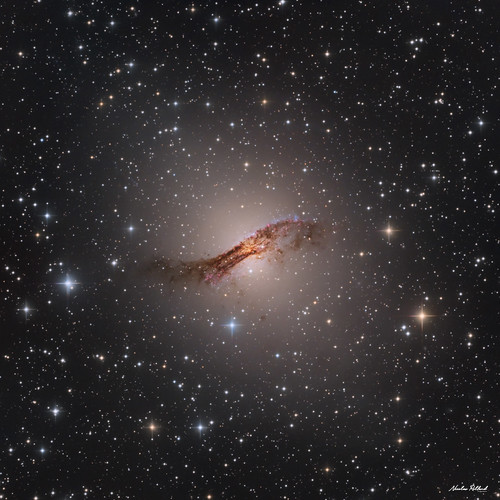
Bright Galaxy Centaurus A by Nicolas Rolland, sur Flickr
RA: 13h 25m 27;8s
DEC: -43° 01’ 04"
Size: 28.9 x 28.9 arcmin
Orientation: Up is 0.397 degrees E of N
Location: Centaurus
Distance: 10-16 Mly
Magnitude: 6.8
Acquisition April 2021
Total acquisition time of 2.5 hours.
Optics: Planewave 24“ CDK @ F6.8
Mount: Paramount ME
CCD: FLI PL 9000
Pre Processing: CCDstack, Pixinsight & Excalibrator
Post Processing: Photoshop CC
Copyrights: Nicolas Rolland & Telescope.Live
Full resolution: https://www.astrobin.com/9ab957

Bright Galaxy Centaurus A by Nicolas Rolland, sur Flickr
RA: 13h 25m 27;8s
DEC: -43° 01’ 04"
Size: 28.9 x 28.9 arcmin
Orientation: Up is 0.397 degrees E of N
Location: Centaurus
Distance: 10-16 Mly
Magnitude: 6.8
Acquisition April 2021
Total acquisition time of 2.5 hours.
Optics: Planewave 24“ CDK @ F6.8
Mount: Paramount ME
CCD: FLI PL 9000
Pre Processing: CCDstack, Pixinsight & Excalibrator
Post Processing: Photoshop CC
-
KuriousGeorge
- Science Officer
- Posts: 218
- Joined: Wed Dec 30, 2015 7:07 am
- Location: San Diego, CA
- Contact:
Re: Submissions: 2021 June
The Little Cocoon Nebula (SH2-82)
Image 2 of 3 from my 21.5+ SQM June dark cycle.
"Sh2-82 is a beautiful cloud of gas and dust consisting of an emission nebula enveloped by a hazy reflection nebula. It is embedded in the dark nebula LDN 727 and is the site of some star formation and young stellar objects. Located at a distance of approximately 3600 light years, Sh2-82 is ionized by the star HD 231616, which can be seen near the center."
https://www.astrobin.com/fp6c68/
Image 2 of 3 from my 21.5+ SQM June dark cycle.
"Sh2-82 is a beautiful cloud of gas and dust consisting of an emission nebula enveloped by a hazy reflection nebula. It is embedded in the dark nebula LDN 727 and is the site of some star formation and young stellar objects. Located at a distance of approximately 3600 light years, Sh2-82 is ionized by the star HD 231616, which can be seen near the center."
https://www.astrobin.com/fp6c68/
-
Ayiomamitis
- Science Officer
- Posts: 129
- Joined: Wed Aug 18, 2004 3:32 pm
- Location: Athens, Greece
- Contact:
Re: Submissions: 2021 June
Mother
http://www.perseus.gr/Astro-Star-Trails ... r-2020.htm
Copyright: Anthony Ayiomamitis
Something from about this time last year taken under pristine transparency on the island of Aegina and 40 minutes southwest of Athens by ferry. As for the foreground, something very dear to everyone's heart!
http://www.perseus.gr/Astro-Star-Trails ... r-2020.htm
Copyright: Anthony Ayiomamitis
Something from about this time last year taken under pristine transparency on the island of Aegina and 40 minutes southwest of Athens by ferry. As for the foreground, something very dear to everyone's heart!
Anthony Ayiomamitis
http://www.perseus.gr
http://www.perseus.gr
-
KuriousGeorge
- Science Officer
- Posts: 218
- Joined: Wed Dec 30, 2015 7:07 am
- Location: San Diego, CA
- Contact:
Re: Submissions: 2021 June
NGC 3718
My third and final object for the June dark cycle with skies at 21.5+ SQM.
This object was a particular challenge because I could only capture it from 9:30 to 11:30 PM. After that is was too low to get the 2" average FWHM I was aiming for.
Because I could only capture 2 hours each evening, it took over a week to get what you see here. But I think it was worth it. (-:
"NGC 3718, also called Arp 214, is a galaxy located approximately 52 million light years from Earth in the constellation Ursa Major. It is either a lenticular or spiral galaxy.
NGC 3718 has a warped, s-shape. This may be due to gravitational interaction between it and NGC 3729, another spiral galaxy located 150,000 light-years away."
https://www.astrobin.com/mhicxj/
My third and final object for the June dark cycle with skies at 21.5+ SQM.
This object was a particular challenge because I could only capture it from 9:30 to 11:30 PM. After that is was too low to get the 2" average FWHM I was aiming for.
Because I could only capture 2 hours each evening, it took over a week to get what you see here. But I think it was worth it. (-:
"NGC 3718, also called Arp 214, is a galaxy located approximately 52 million light years from Earth in the constellation Ursa Major. It is either a lenticular or spiral galaxy.
NGC 3718 has a warped, s-shape. This may be due to gravitational interaction between it and NGC 3729, another spiral galaxy located 150,000 light-years away."
https://www.astrobin.com/mhicxj/
Re: Submissions: 2021 June
Hi !
The Seahorse Nebula (Barnard 150 / LDN 1082)

The full is here : https://www.astrobin.com/vioc2p/
Asi 2600mc pro gain 100 offset 50 cooled to -10 ° C
TS Photon 8 '' 200/800
Eq6R pro
Altaïr 60/225 and zwo 290mm mini guide
50x600
Acquisition: Nina / PHD 2
Processing: Siril / PS
Yann SAINTY - France - 06/14/21
The Seahorse Nebula (Barnard 150 / LDN 1082)

The full is here : https://www.astrobin.com/vioc2p/
Asi 2600mc pro gain 100 offset 50 cooled to -10 ° C
TS Photon 8 '' 200/800
Eq6R pro
Altaïr 60/225 and zwo 290mm mini guide
50x600
Acquisition: Nina / PHD 2
Processing: Siril / PS
Yann SAINTY - France - 06/14/21
Re: Submissions: 2021 June
M33 to SH2-126
A 21°x42° view which covers most of the constellations Andromeda and Lacerta is presented. The center of the photographed region lies about 20° south of the galactic plane and is rich of high galactic latitude nebulae. Most famous objects are M33 (Triangulum galaxy), M31 (Andromeda Galaxy) and SH2-126, a large HII region in Lacerta.
Views below are scaled down. Larger version can be loaded by clicking on the image, full resolution pictures (>100 MPixel, using a Javascript viewer), selected details and further information can be found on my homepage
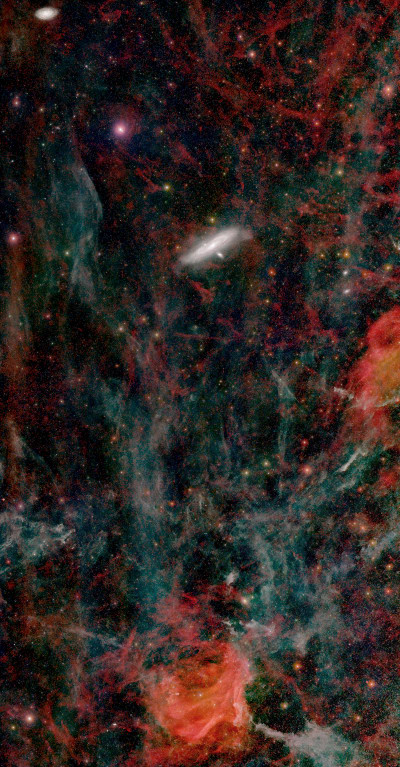
Full view. H-alpha is mapped to red, blue continuum is mapped to green and red continuum is mapped to blue. Stars are partly subtracted.
In that orientation it looks like M31 and M33 are faling into the mouth of a red monster ...

But the real monster is M31, currently eating M32 (the smaller one) and M110. The remnants of previous meals are visible in form of a irregularly shaped halo.
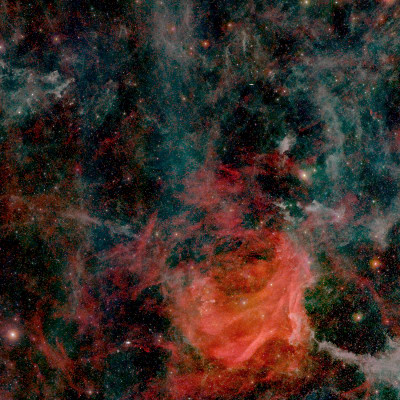
SH2-1236 surrounded by high galactic latitude nebulae.
A 21°x42° view which covers most of the constellations Andromeda and Lacerta is presented. The center of the photographed region lies about 20° south of the galactic plane and is rich of high galactic latitude nebulae. Most famous objects are M33 (Triangulum galaxy), M31 (Andromeda Galaxy) and SH2-126, a large HII region in Lacerta.
Views below are scaled down. Larger version can be loaded by clicking on the image, full resolution pictures (>100 MPixel, using a Javascript viewer), selected details and further information can be found on my homepage

Full view. H-alpha is mapped to red, blue continuum is mapped to green and red continuum is mapped to blue. Stars are partly subtracted.
In that orientation it looks like M31 and M33 are faling into the mouth of a red monster ...

But the real monster is M31, currently eating M32 (the smaller one) and M110. The remnants of previous meals are visible in form of a irregularly shaped halo.

SH2-1236 surrounded by high galactic latitude nebulae.
Re: Submissions: 2021 June
 هلال رجب يحتضن القمر القديم by Mohmmad Alobaidi, on Flickr
هلال رجب يحتضن القمر القديم by Mohmmad Alobaidi, on Flickrhttps://flic.kr/p/2kBw2U3
Canon Ra
Celestron 8”HD
5 sec
Re: Submissions: 2021 June
Hello!
NGC7822 Camera: ZWO ASI533
Telescope: Sharpstar 61EDPhii + 0.8x
Filter: Optolong L xtreme
Mount: Skywatcher AZGTI
300s x 176
Capture software: ASIAIRPRO
Regina SK, Canada
NGC7822 Camera: ZWO ASI533
Telescope: Sharpstar 61EDPhii + 0.8x
Filter: Optolong L xtreme
Mount: Skywatcher AZGTI
300s x 176
Capture software: ASIAIRPRO
Regina SK, Canada

